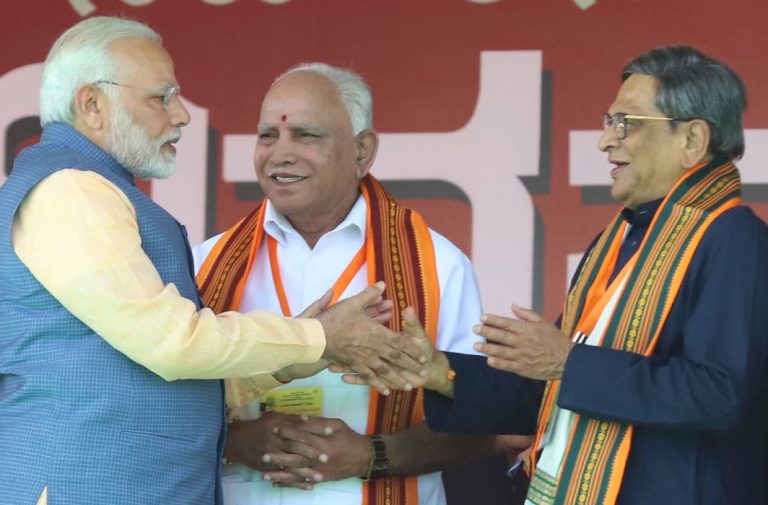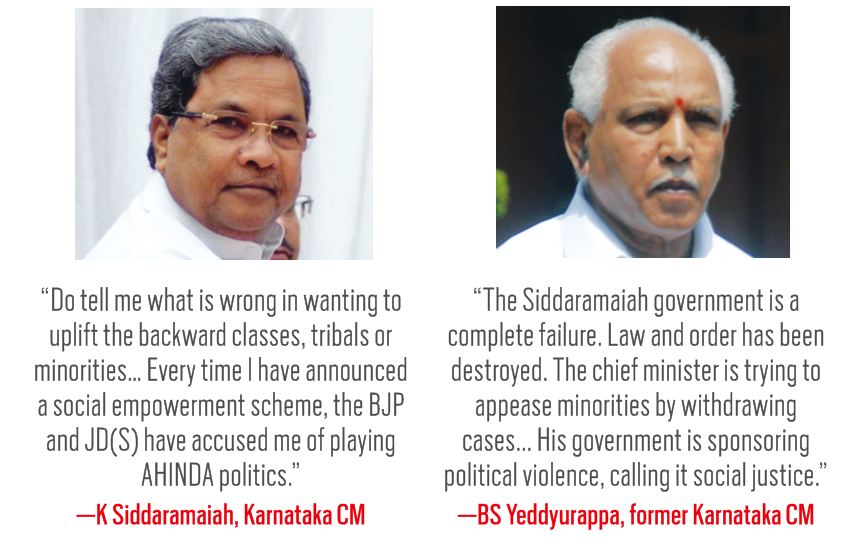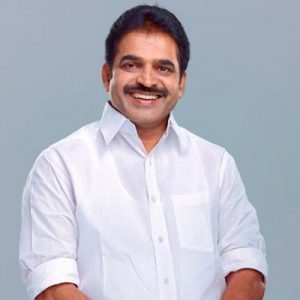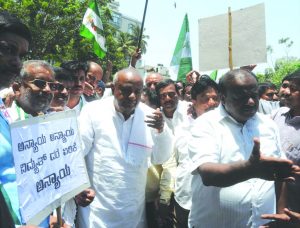
The Congress is battling to retain power in the last big state under its rule even as the BJP tries to revive its victory march
~By Puneet Nicholas Yadav
In a little over a month from now, the Election Commission is likely to announce the schedule for the Karnataka assembly polls. Since 1985, the southern state has followed two distinct voting patterns —first, it has always voted for one party or coalition during the Lok Sabha elections and another for the state and second, no incumbent government has been re-elected.
In that sense, whatever the outcome of the Karnataka elections may be, the results would break a trend that has continued for over three decades.
The departure from electoral tradition aside, the elections due in April-May assume a much larger political significance. Karnataka is the only big state that continues to have a Congress government; one that Prime Minister Narendra Modi and BJP president Amit Shah will try assiduously to dislodge in the hope of inching closer to their vengeful ambition of a “Congress-mukt Bharat”. Expectedly, the Grand Old Party, led in the state by chief minister K Siddaramaiah will do all it takes to retain power in the 224-member Karnataka Vidhan Soudha.
Congress sources told India Legal that Siddaramaiah has assured party president Rahul Gandhi of a landslide victory in Karnataka, but with the rider that he should be given a free hand in the selection of candidates and designing the campaign strategy. If Siddaramaiah delivers on this promise, the result will signal a revival of the Congress’ electoral fortunes following four years of disastrous poll drubbings, with the exception of its recent narrow defeat in Gujarat.
Aware that a defeat would severely blunt the recent surge in morale of party workers and reflect poorly on party chief, Rahul Gandhi, the Congress state leadership seems to have overcome its age-old affliction of factional feuds and is rallying behind Siddaramaiah.
In stark contrast, the hunger for electoral victories that seems to bring together all warring factions within the BJP before polls appears to be missing in Karnataka. Sources in the saffron party told India Legal that the BJP’s decision to repose its faith in former chief minister BS Yeddyurappa, the man who had helped the party form its first government in the state a decade ago, has caused fissures within the ranks. Factions of the state leadership led by Yeddyurappa, former chief minister Jagdish Shettar, senior leader KS Eshwarappa and Union ministers Ananth Kumar and Anant Kumar Hegde, each want a lion’s share of tickets for their supporters.
“People have realised the BJP’s deceit”
AICC general secretary in-charge of Karnataka, KC Venugopal talks to Puneet Nicholas Yadav about the challenges facing the Siddaramaiah government as the state goes to the polls in two months
 The BJP is using its hardline Hindutva faces for the Karnataka campaign. Is this an attempt to polarise the electorate?
The BJP is using its hardline Hindutva faces for the Karnataka campaign. Is this an attempt to polarise the electorate?
The BJP’s divide and rule strategy will not work in Karnataka. Secularism is not just the strength of the Congress but the backbone of our society. The BJP’s attempt to rake up petty, divisive issues will be squarely rejected by the Kannadigas. We will solicit votes on the basis of the work that the Siddaramaiah government has done and what it proposes to do when voted back to power. We are already working on a Vision Karnataka document which will outline our agenda for the next five years. The BJP can continue dreaming that its communal plank will help it win votes.
Will the election once again see Congress president Rahul Gandhi visiting temples as he did in Gujarat?
The Congress president will campaign throughout the state. Visits to religious places are not being specifically designed, but yes, if the people want him to visit some temple, mosque or church, what is wrong with it? The Congress believes in inclusiveness. Why doesn’t the media question BJP leaders when they visit temples or about their reluctance to visit religious monuments that have significance for minorities?
Karnataka is engaged in two legal battles with other states—sharing of the waters of Cauvery and Mahadayi rivers. Will these emerge as a major poll plank?
Yes, but both these cases have to be resolved through dialogue between the leadership of the states involved and not through political rhetoric. I don’t wish to comment on the cases per se as they are sub judice but the fact is that there are two tribunals looking into these. Karnataka has made its position clear—it can’t share the Cauvery waters and it needs more water from the Mahadayi because its farmers are in distress and the state’s economy is dependent on agriculture. Mr Yeddyurappa tried to play a political stunt by claiming that he had received a letter from Goa chief minister (Manohar Parrikar) assuring him of Goa’s willingness to share Mahadayi waters. This is mischief and it was promptly exposed by the BJP’s alliance partners in Goa who said they will never agree to sharing these waters. If Parrikar was willing to share Mahadayi waters, why was he discussing it with Yeddyurappa? Why didn’t he write officially to Modi and the tribunal saying this is his government’s position?
Many within the BJP feel that by projecting Yeddyurappa as the chief ministerial candidate, the party will lose the credibility it needs to give weight to its allegations of corruption against the Siddaramaiah government. Yeddyurappa’s term as chief minister saw a slew of corruption scandals, most prominently the multi-crore mining scam in Bellary district. Siddaramaiah has made it a point to constantly remind the Kannadiga people of Yeddyurappa’s alleged corruption.
The third political entity in the state, former Prime Minister HD Deve Gowda’s Janata Dal (Secular) remains a formidable force in Old Mysore region and is popular with the politically crucial Vokkaliga (farmer community) votebank which comprises of 15 to 17 per cent of Karnataka’s electorate. However, the differences between Gowda and his son, former chief minister HD Kumaraswamy, the latter’s limited appeal among the electorate and the perception of the party being run like a “family enterprise” has got the Congress hopeful of making a dent in JD(S) strongholds.
Once a key protégé of Deve Gowda, Siddaramaiah can think both as a Congressman and a JD(S) poll manager. With the experience of having presented as many as 13 state budgets, Siddaramaiah is also well-equipped to counter the BJP on the issue of development in the state. The Congress satrap has also pre-empted and punctured his saffron rival’s poll trick by smartly raking up the issue of Kannadiga pride as a counter to the BJP’s politics of enforcing the Hindutva identity, by raising the demand for a separate flag for Karnataka, making Kannada a compulsory subject in schools and replacing Hindi signages with Kannada ones.
The chief minister also seems a step ahead of Modi at being prepared with prompt repartees to any attack made by the latter about the performance of his government. During his recent campaign tour in Karnataka, Modi attacked the Siddaramaiah government for bringing development in the state to a standstill. Siddaramaiah shot back the same day, putting out figures—including those from reports compiled by the central government—to show that Karnataka was performing better than most other states on various indices of development.
Choppy waters
The Supreme Court’s verdict in the Cauvery water dispute which grants Karnataka a greater share than Tamil Nadu is a major boost for the Congress. Tamil Nadu has grudgingly accepted the verdict but politics over waters between states have traditionally been volatile and unaffected by verdicts delivered by courts. It is up to the centre and the states concerned to ensure that things don’t spiral out of control.
Siddaramaiah is expectedly jubilant over the verdict. However, the SC decision has also laid down the doctrine for settling other inter-state river water disputes by stating: “Waters of an inter-State river passing through the corridors of the riparian States constitute national asset and cannot be said to be located in any one State”.
This part of the verdict may decide another water-sharing, four-decade long dispute between Karnataka and Goa over the Mahadayi river. The Mahadayi Water Disputes Tribunal is yet to resolve the dispute. Prime Minister Modi has stayed silent on Siddaramaiah’s demand for his intervention and support in getting north Karnataka districts their “rightful share” of Mahadayi waters. The Karnataka CM has projected this impasse to underscore BJP’s “anti-Kannadiga” stance—one that he says will turn the state’s Malaprabha basin into a parched land.
The Mahadayi river dispute has been showcased by successive governments in Karnataka as a battle for the rights of farmers in the Belagavi, Dharwad, Gadag and Bagalkot districts. Goa is opposed to Karnataka’s plan for diverting water from Mahadayi’s tributaries through the Kalasa-Bhanduri Nala project. Goa fears the project will deprive farmers of their share of the Mahadayi (called Mandovi in the state) waters. Over two-thirds of the 111-km-long river flows through Goa.
The recent verdict by the Supreme Court over the decades-old Cauvery river water sharing dispute which has now granted Karnataka rights over an additional 14.75 tmcft of water per year by bringing down Tamil Nadu’s share to 404.25 tmcft instead of 419 tmcft comes as a major shot in the arm for Siddaramaiah and the Congress ahead of the polls. If Siddaramaiah is able to convince the electorate of the verdict being a result of his government’s efforts, he could help the Congress make major gains in south Karnataka districts and in Bengaluru—areas which fall under the Cauvery basin and are strongholds of the JD(S) and BJP.
Congress sources told India Legal that Siddaramaiah is also stridently reviving a caste permutation that could be the Grand Old Party’s winning formula. Traditionally, politics in Karnataka has been dominated by two communities, the Vokkaligas and the Lingayats (a Hindu sect, worshippers of Lord Shiva). Yeddyurappa is arguably the state’s tallest Lingayat leader. The Congress, which once had the support of a section of the Vokkaliga community and would reach out to minorities and tribals, is trying to consolidate a coalition of AHINDA (Kan-nada acronym for minorities, backward classes and Dalits) leaders. It is also attempting to cause a split in the BJP’s Lingayat votebank by publicly supporting the demand to grant Veerashaiva Lingayats the status of a separate religious entity.
Sources say that Siddaramaiah’s plan of fortifying an AHINDA axis is based on insider information that his political rivals in the BJP and JD(S) do not have. A Congress leader told India Legal that report of a caste census carried out under the current regime had been presented to Siddaramaiah several months ago. Though the state government hasn’t tabled the caste census in the Vidhan Soudha, the Congress is using it to plan its Vision Karnataka document, election manifesto and even select candidates. The Congress leader said that the caste census has indicated that the state’s AHINDA population is now far greater than the Vokkaligas or the 19 percent Lingayat lobby.
Asked if he was pandering to caste-politics, Siddaramaiah told India Legal: “Do tell me what is wrong in wanting to uplift the backward classes, tribals or minorities… In the past five years of my government, every time I have announced a social empowerment scheme, be it the Anna Bhagya or Krishi Bhagya schemes, the BJP and JD(S) have accused me of playing AHINDA politics. Helping the AHINDA is better than the communally divisive politics of the BJP or the lip service that the JD(S) pays to the Vokkaligas because it is the politics of empowerment.”
Deve Gowda, the kingmaker?
 Many political observers in Karnataka believe that though the Congress seems to have an upper hand over its rivals—the BJP and JD(S)—in the state for the moment, Siddaramaiah’s “overconfidence and arrogance” could prevent the party from reaching the majority mark of 113 in the 224-member Vidhan Soudha.
Many political observers in Karnataka believe that though the Congress seems to have an upper hand over its rivals—the BJP and JD(S)—in the state for the moment, Siddaramaiah’s “overconfidence and arrogance” could prevent the party from reaching the majority mark of 113 in the 224-member Vidhan Soudha.
Unsure of its victory, sources say the BJP is already working on a Plan B to return to power. Highly placed sources in the saffron party told India Legal that party president Amit Shah is trying to woo fringe political groups to set up independent candidates in a large number of rural and semi-rural seats, hoping that they would cut into the Congress’ votes. Back channel talks are also on with the Deve Gowda-led JD(S).
Though there is no possibility of a pre-poll alliance between the BJP and JD(S), sources said that the saffron party is working on an arrangement with the regional outfit. The BJP is unlikely to field strong candidates against JD(S) nominees in districts like Mysuru, Mandya, Hassan, Bengaluru Rural, Ramanagara and Chikkaballapur where Deve Gowda’s writ still holds sway. Similarly, in coastal Karnataka where the BJP is strong, Shah will try to convince the JD(S) chief against fielding formidable leaders.
The BJP, sources say, believes that if it can’t win a majority on its own, its understanding with the JD(S) can precipitate a hung assembly, following which the two parties can come to power through a post-poll alliance. This would make Deve Gowda the kingmaker in Karnataka but will the former prime minister agree to the BJP’s ambitious plan?
The Karnataka government recently decided to withdraw cases filed against members of the minority community who were booked for communal disturbances. The BJP accused the Congress of “working against the Hindus”. Siddaramaiah promptly tweaked the directions, ordering that cases filed against farmers during various agitations over the past five years and also against pro-Kannada activists, should be withdrawn too. This was seen as a political ploy. Yeddyurappa told India Legal: “The Siddaramaiah government is a complete failure. Law and order in the state has been completely destroyed. The chief minister is trying to appease minorities by withdrawing cases… The public will see through his devious politics. His government is sponsoring political violence and calling it social justice.”
In the past five years of Congress rule, Karnataka has witnessed gruesome murders of rationalists like MM Kalburgi and more recently, senior journalist Gauri Lankesh. The murders were seen as an attempt to silence people with an influential social profile who spoke against issues that are seen as part of the BJP’s political agenda. While the killings have put the BJP on the defensive, little progress has been made in the investigations of these cases. Siddaramaiah, though, dismisses this charge. “Investigations are going on in each of these cases by the concerned agencies. Please don’t forget that it was I who immediately convened a meeting of senior police officials and announced an SIT after the murder of Gauri Lankesh. We want a fair probe and I can assure you that the guilty will be brought to book,” he said.
Meanwhile, in a worrying sign for the BJP, rallies addressed by Narendra Modi and Amit Shah in different parts of Karnataka have evoked lukewarm response. On the other hand, Rahul Gandhi’s public meetings and discussions with common people over “chai and pakoras” have been received well.
With a great deal at stake for both parties, it would not be an exaggeration to say that the political narrative for the next Lok Sabha polls, will be scripted based on who Kannadigas vote for.

